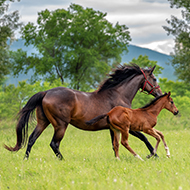Funding boost for thoroughbred breeding research

Scientists believe that early life experiences can alter a horse's susceptibility to disease in later life.
Researchers at the Royal Veterinary College (RVC) have been awarded funding to study the early-life influences on the performance and financial viability of Thoroughbred breeding.
Understood to be the first study of its kind in the UK, scientists hope the research will improve athletic performance and strengthen stud farm sustainability.
In the study, funded by the Horserace Betting Levy Board and the Racing Foundation, Dr Rebecca Mouncey and her team will analyse information from a group of young Thoroughbreds born in 2019 and 2020.
As part of the ongoing research set up during Rebecca's PhD, the horses have been monitored since birth, and records of their breeding and veterinary histories, the turn-out and exercise they received, any episodes of sickness or injury, and routine procedures like farriery have been kept.
Using these exposures, alongside financial data and evaluating sales, training and racing outcomes, the team aims to:
describe the proportions of horses that enter training and race, including reasons and destinations of any that do not
evaluate the effects of early-life health and exercise on horses’ training and racing performance
calculate costs of production and evaluate stud farm profitability
assess the financial impact of early-life disease and injury.
Scientists believe that early life experiences can alter a horse's susceptibility to disease in later life – a theory that has been proven in studies of humans.
While data suggest there has been little change in the number of horses entering training or winning prize money over the last twenty years, there is little evidence to explain why some horses fail to achieve these milestones.
Researchers say it is timely to address these knowledge gaps, particularly around the costs of disease and injury, especially given the current economic climate in which, they report, a rising number of Thoroughbred breeders are unprofitable.
Dr Mouncey, a veterinary surgeon and post-doctoral researcher at the RVC, said: “Musculoskeletal disease and injury remain the greatest barrier to Thoroughbreds being retained within the industry and realising their maximum athletic potential and is likely to have important economic consequences, particularly in the current financial climate.
“Our study will provide vital and directly applicable information at both horse- and farm-level, evaluating the influence of early-life management and health on production costs, profitability and racing performance in Thoroughbreds.”



 Julian Hoad has been confirmed as the new president of the British Small Animal Veterinary Association (BSAVA), taking over from Carl Gorman.
Julian Hoad has been confirmed as the new president of the British Small Animal Veterinary Association (BSAVA), taking over from Carl Gorman.